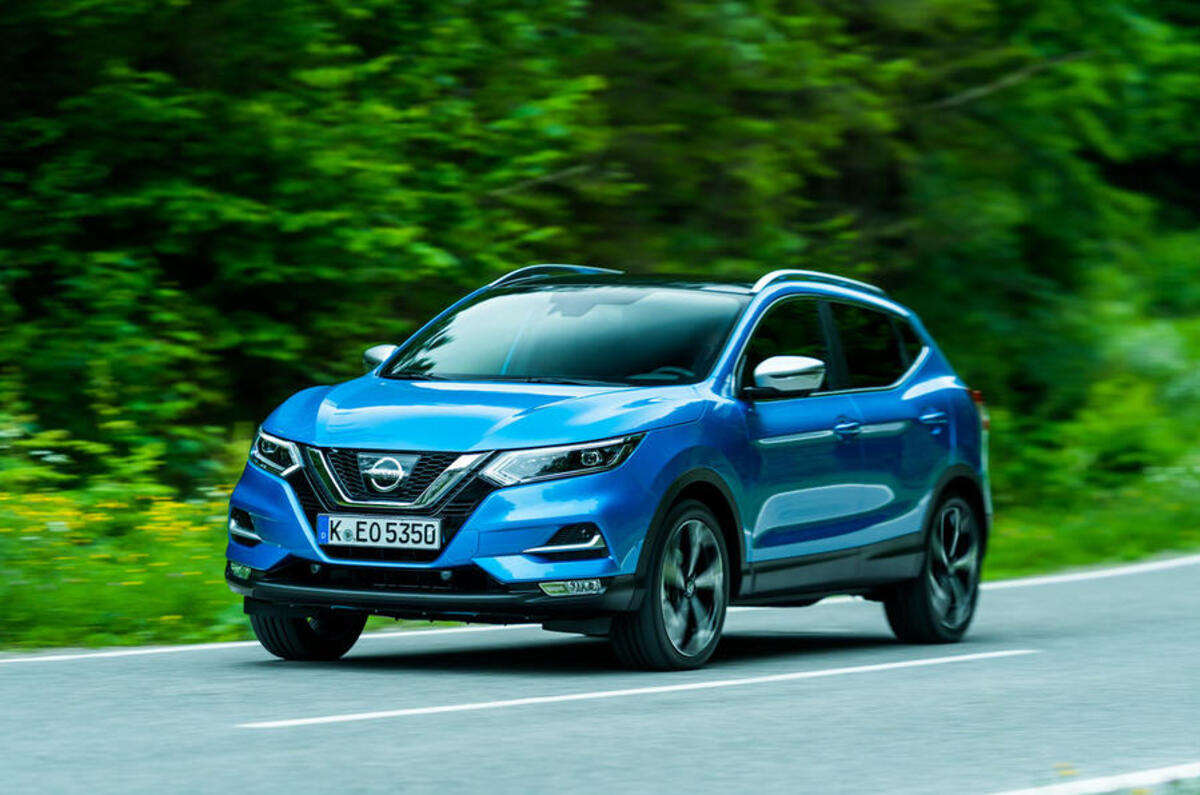Nissan is replacing its 1.2-litre and 1.6-litre petrol engines in the Nissan Qashqai with a 1.3-litre unit in two states of tune.
Variants with 138bhp and 158bhp will instead be offered, with improved claimed fuel economy and emissions figures over the 113bhp 1.2 and 161bhp 1.6 engines they replace.
Nissan claims an average of 53.3mpg for the engine in both states of tune, or 49.6mpg with 18in wheels or larger fitted - an improvement of 1.9mpg over the 1.2 and 4.6mpg over the 1.6. An 8g/km improvement in CO2 emissions for the less powerful engine and a 13g/km improvement for the 158bhp version is claimed, with 121g/km of CO2 emitted.
Torque for the lower-powered Qashqai is 37lb ft higher than the previous 1.2-litre car, at 177lb ft, and 15lb ft higher for the 158bhp car than the outgoing 1.6, at 192lb ft.
An extra 7lb ft is unlocked in the higher-powered engine if the new seven-speed dual-clutch automatic gearbox is fitted.
Prices for the Qashqai now start at £19,595 for the 138bhp version in entry-level Visia spec - £395 more than the 113bhp 1.2-litre entry-level car previously.
A petrol particulate filter is fitted to the 1.3 DIG-T Qashqai to ensure Euro 6D compliance, while Nissan claims that the higher low-end torque means the car will be quieter, given the reduced need for higher revs, while the oil change interval is now 18,000 miles rather than 12,500 miles.
The Qashqai is one of the UK’s best-selling cars, having climbed to third in the sales charts, beneath the Ford Fiesta and Volkswagen Golf.
It’s also Europe’s best-selling SUV of any size, with more than 180,000 sales accrued this year so far. It’s among the three best-selling cars in six European countries, too.
Read more:
2019 Honda CR-V hybrid: diesel-rivalling CO2, economy figures released




Join the debate
Add your comment
This engine will soon be everywhere.....
Mercedes, Renault, Dacia and Lada will all be using it.
I hope its more reliable than the old 1.2 unit which was notoriously unreliable.
Good improvements, but its
Good improvements, but its hybrid that is will give diesel the real challenge, to put the new Qashqai engine in perspective, the much bigger and more powerful (184bhp) new CR-V petrol hybrid acheives 120g/km and 53.3mpg against the Nissans 158bhp with 121g/km 53.3mpg.
Sounds like a win win situation
Regarding Sundym question about GPF. Petrol ones are nothing like Diesel ones, they're simple and passive i.e. need no monitoring and they're also cheap (they reckon it adds around £25 to a car).
Also, they only really need to go on direct injection engines and only then as a precaution. VAG were the first of the big boys to do it in a bid to clean up their image.
.
No monitoring? Where did you hear that from? Example: Every remap tuner for turbo cars has a new pain in the arse because of the filters. The m140i for example now has PPF post June 2018 (same B58 lump), and the same as previous aftermarket exhaust provider's products are throwing errors all over the shot on modded cars - so there is certainly monitoring / integration with the ECU. And a small power reduction normally. I am sure it isn't as heavy, but there is certainly electronics involved.
Re programming cars presents many problems
$25 cost was from several places including transportenvironment.org
The following is from the Mercedes tech site ".....has a high filtration efficiency and is also maintenance-free and self-regulating." Maintenance free is the key figure.
Obviously I didn't allow for MODDED cars. But with new MOT rules removing exhaust control features is a fail anyway.
Open or intergated GPF
I can only think BMW made it part of a four-way catalytic converter with integrated gasoline particle opposed to just putting the GPF downstream on it's own. VAG will probably go down this route.